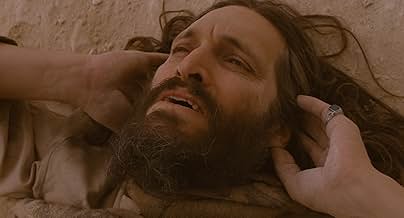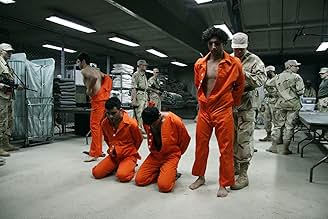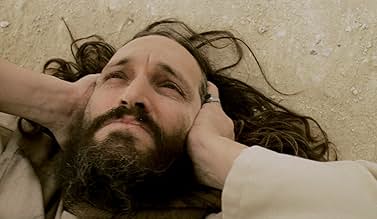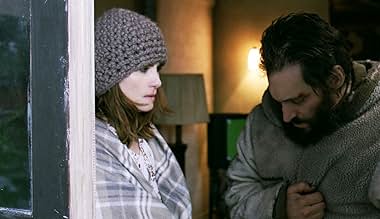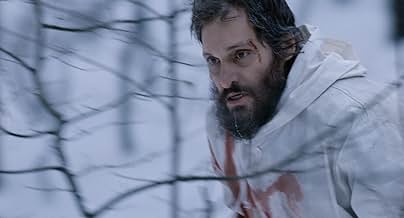VALUTAZIONE IMDb
6,1/10
8274
LA TUA VALUTAZIONE
Segui questa storia di un prigioniero di guerra afghano durante il suo tentativo di fuga.Segui questa storia di un prigioniero di guerra afghano durante il suo tentativo di fuga.Segui questa storia di un prigioniero di guerra afghano durante il suo tentativo di fuga.
- Regia
- Sceneggiatura
- Star
- Premi
- 15 vittorie e 9 candidature totali
David L. Price
- Interrogation Officer
- (as David Price)
Recensioni in evidenza
Essential Killing begins in a desert gorge in Afghanistan, with three off duty American soldiers on a dubious, unspecified outing, possibly in search of stashed loot. Also in the gorge is an Afghan man, listed in the credits as Mohammed (an initially unrecognisable Vincent Gallo). He spies the Americans and flees to a crevice concealing a dead Afghan holding a bazooka. Who killed this man is unclear. As the Americans approach and their suspicions are aroused, Muhammad fires the weapon and obliterates them, alerting an accompanying American chopper which swoops in and quickly apprehends him.
It's best to go into the film without knowing too many details beforehand, suffice it to say that a shell-shocked Mohammed is taken for interrogation before being transferred out of Afghanistan and managing, in a scenario that will be familiar to fans of a certain film about a fugitive, to escape and flee. While this might sound, and indeed does initially appear like standard action film fodder, what distinguishes Essential Killing is the boldness of the manner in which Mohammed's subsequent experience is conveyed. The audience is slyly forced to share in his disorientation at being jolted out of his homeland. As the film progresses, it becomes clear that an individual's perception of where they are or where the path lies can change quickly.
Questions of lazy or fanciful plot contrivances, such as why a crash scene is abandoned with a prisoner still missing, or why a domesticated Border Collie opportunely appears in the middle of nowhere, are subsumed by the increasingly evident hallucinatory nature of Mohammed's journey. These hallucinations are most effective when their verisimility is left open, occasionally though they err towards overstatement. What emerges is like a fusion of The Fugitive's pulsating action with the aesthetic sensibilities of Dog Star Man and Far North. The finished article is reminiscent of the impressionistic WW2 escape film Diamonds of the Night.
While it would be impossible to consider Mohammed an innocent victim of circumstance, his brutal actions are clearly motivated by fumbling, disoriented desperation rather than malice, his violence is that of a frightened animal lashing out and grabbing what it needs to survive. Likewise, the treatment of the interrogations is admirably matter of fact. There's no hint of the sensationalism displayed in films such as Rendition and Body of Lies. Neither Mohammed nor the soldiers are allowed to descend into caricature; instead their depiction is refreshingly economical.
Essential Killing is likely to receive criticism at several levels. It forgoes any excursions into glib didacticism while telling a story from the point of view of an Afghan prisoner of war, but it also binds this protagonist with the unfamiliar companions of chase thriller tropes and art house digressions. Similar treatment in recent films such as Vinyan and Antichrist has tended to divide viewers quite sharply. Essential Killing is arguably a more measured work, although still a bold and original one. Anyone willing to take it on its own terms may find an extremely absorbing film.
It's best to go into the film without knowing too many details beforehand, suffice it to say that a shell-shocked Mohammed is taken for interrogation before being transferred out of Afghanistan and managing, in a scenario that will be familiar to fans of a certain film about a fugitive, to escape and flee. While this might sound, and indeed does initially appear like standard action film fodder, what distinguishes Essential Killing is the boldness of the manner in which Mohammed's subsequent experience is conveyed. The audience is slyly forced to share in his disorientation at being jolted out of his homeland. As the film progresses, it becomes clear that an individual's perception of where they are or where the path lies can change quickly.
Questions of lazy or fanciful plot contrivances, such as why a crash scene is abandoned with a prisoner still missing, or why a domesticated Border Collie opportunely appears in the middle of nowhere, are subsumed by the increasingly evident hallucinatory nature of Mohammed's journey. These hallucinations are most effective when their verisimility is left open, occasionally though they err towards overstatement. What emerges is like a fusion of The Fugitive's pulsating action with the aesthetic sensibilities of Dog Star Man and Far North. The finished article is reminiscent of the impressionistic WW2 escape film Diamonds of the Night.
While it would be impossible to consider Mohammed an innocent victim of circumstance, his brutal actions are clearly motivated by fumbling, disoriented desperation rather than malice, his violence is that of a frightened animal lashing out and grabbing what it needs to survive. Likewise, the treatment of the interrogations is admirably matter of fact. There's no hint of the sensationalism displayed in films such as Rendition and Body of Lies. Neither Mohammed nor the soldiers are allowed to descend into caricature; instead their depiction is refreshingly economical.
Essential Killing is likely to receive criticism at several levels. It forgoes any excursions into glib didacticism while telling a story from the point of view of an Afghan prisoner of war, but it also binds this protagonist with the unfamiliar companions of chase thriller tropes and art house digressions. Similar treatment in recent films such as Vinyan and Antichrist has tended to divide viewers quite sharply. Essential Killing is arguably a more measured work, although still a bold and original one. Anyone willing to take it on its own terms may find an extremely absorbing film.
The film starts with an awesome aerial view of the desert n ends in the vast frozen woodland.
A man (Vincent Gallo) responsible for killing three US soldiers is shifted to an unknown location somewhere in Poland. He gets a chance to escape into the frozen wilderness n from this moment on our fugitive has to resort to essential killing n various other stuff to survive, including sucking milk from a lactating female. Even Takashi Mike must hav not thot about this kinda thing.
Vincent Gallo's acting is the highlight. His facial expressions speaks more than words. The director n cinematographer shud be commended for their effort.
I saw this film today. While not perfect, it is a very good film. This is about a character that does not want to kill at all, feels horrible about it, but has no other choice. Gallo's performance is his best yet, very convincing and telling. The cinematography is stunning. The music is also quite good, adding more to the tension. (I didn't like the end credits song very much though). It's a very simple story, but it is told well. I appreciate this kind of film, where there is not a great deal of dialogue, just a simple story, good acting, and great photography. I don't need a ton of action, plot twists, subplots, or overindulgent dialogue. So something like Essential Killing is a film I can enjoy. Of course that doesn't mean it's for everyone.
There are a few small weaknesses (I found the ending felt very abrupt - maybe there could have been a way to make it feel less so), but overall I would rate the film an 8.5. It is a compelling, revealing and rewarding experience.
There are a few small weaknesses (I found the ending felt very abrupt - maybe there could have been a way to make it feel less so), but overall I would rate the film an 8.5. It is a compelling, revealing and rewarding experience.
I can't say that 'Essential Killing' is essential viewing. It's about a man named Mohammed (Vincent Gallo), a terrorist on the run from the US army in Afghanistan. Mohammed is captured and detained in a Guantanamo Bay facsimile, where he is given the treatment we've all read about. But en route to being transferred, perhaps extradited, the car he's in crashes on the snowy roads of Poland where he makes good his escape. The rest of the film is a chase.
One thing the film tries to do is humanise Mohammed. Recurring visions of his unveiled wife and child, and excerpts from the Koran, influence us into believing that Mohammed himself isn't a threat, but the fascistic ideology he subscribes to is ('Allah killed those men', his thought-process reassures him after he's killed a number of innocents).
Watching this film I kept wondering if Gallo was the right choice. I won't say it would have been better for a Middle-Easterner to play Mohammed because that would betray the very idea of acting. But one thing's for sure: Gallo doesn't convince as an Afghan.
There are too many conveniences. Mohammed is rendered deaf by an explosion, so can't respond to people. (Would it have been that difficult to learn a few words of Pashto?). It's apocryphal that he'd be such an efficient killer in his emaciated condition. And would being attacked by feral dogs, caught in a bear trap, crushed by a tree, starved and submerged in sub-zero waters not be enough to kill you? Apparently not mighty Mohammed.
The disjointed score is a distraction. Clearly that's the point, but it would have made what little suspense there is no less palpable to have no soundtrack at all. Director Jerzy Skolimowski might have realised from the absence of dialogue that silence is often the loudest noise.
It's a demanding role physically, and Gallo gives an almost animalistic portrayal of a man whose only dilemma is kill or be killed. What's both good and bad is that Gallo doesn't appear to be acting. The film features a few harrowing scenes, including one where Gallo, desperate for nourishment, sucks the milk from a pregnant woman's breast while she's breastfeeding her child. I'm sure I've never seen anything quite as grotesque. If any actor was going to do that, it'd have to be him.
www.scottishreview.net
One thing the film tries to do is humanise Mohammed. Recurring visions of his unveiled wife and child, and excerpts from the Koran, influence us into believing that Mohammed himself isn't a threat, but the fascistic ideology he subscribes to is ('Allah killed those men', his thought-process reassures him after he's killed a number of innocents).
Watching this film I kept wondering if Gallo was the right choice. I won't say it would have been better for a Middle-Easterner to play Mohammed because that would betray the very idea of acting. But one thing's for sure: Gallo doesn't convince as an Afghan.
There are too many conveniences. Mohammed is rendered deaf by an explosion, so can't respond to people. (Would it have been that difficult to learn a few words of Pashto?). It's apocryphal that he'd be such an efficient killer in his emaciated condition. And would being attacked by feral dogs, caught in a bear trap, crushed by a tree, starved and submerged in sub-zero waters not be enough to kill you? Apparently not mighty Mohammed.
The disjointed score is a distraction. Clearly that's the point, but it would have made what little suspense there is no less palpable to have no soundtrack at all. Director Jerzy Skolimowski might have realised from the absence of dialogue that silence is often the loudest noise.
It's a demanding role physically, and Gallo gives an almost animalistic portrayal of a man whose only dilemma is kill or be killed. What's both good and bad is that Gallo doesn't appear to be acting. The film features a few harrowing scenes, including one where Gallo, desperate for nourishment, sucks the milk from a pregnant woman's breast while she's breastfeeding her child. I'm sure I've never seen anything quite as grotesque. If any actor was going to do that, it'd have to be him.
www.scottishreview.net
I was not sure where this film was going to go with the story line at hand, was it to be another horror story about the violence of war? It was just a bit hard to work out after watching the trailer on YouTube, as things can look misleading.
But I was glad to see it was not all about blood and gut's, no Rambo style shoot me up type of film, sure there are parts with violence, but it is not the main focus of the storyline, and it put another spin on the way I looked at the war's that are being fought in the Middle East.
And by not giving to much away from this solid film, it is about a fish out of water, but seen from the other side of the fence. It made me think about the conflict of war in a different way. Apparently Jack Nicholson stated, so far it was the best film of year, I am not sure about that, but the film made me think about the madness of the world we live in.
Rock solid 8 out of 10, and could some one tell me the name of the music at the end of the film.
But I was glad to see it was not all about blood and gut's, no Rambo style shoot me up type of film, sure there are parts with violence, but it is not the main focus of the storyline, and it put another spin on the way I looked at the war's that are being fought in the Middle East.
And by not giving to much away from this solid film, it is about a fish out of water, but seen from the other side of the fence. It made me think about the conflict of war in a different way. Apparently Jack Nicholson stated, so far it was the best film of year, I am not sure about that, but the film made me think about the madness of the world we live in.
Rock solid 8 out of 10, and could some one tell me the name of the music at the end of the film.
Lo sapevi?
- QuizThe movie never reveals what part of the world Mohammed has been taken to. But the coordinates given by a helicopter crew, 53 39 N 25 33 E, is located in a heavily wooded area of northwest Belarus.
- BlooperAfter Mohammed falls in the water he climbs out of the lake. However, in the following scene with the dog he seems dry.
- ConnessioniFeatured in At the Movies: Venice Film Festival 2010 (2010)
- Colonne sonoreMie Toleruje - Bije
Music written by Rafal Modlinski, Karol Ludew, Piotr Leniewicz and Adam Adamczyk
Performed by Moja Adrenalina
I più visti
Accedi per valutare e creare un elenco di titoli salvati per ottenere consigli personalizzati
Dettagli
- Data di uscita
- Paesi di origine
- Siti ufficiali
- Lingue
- Celebre anche come
- Essence
- Luoghi delle riprese
- Aziende produttrici
- Vedi altri crediti dell’azienda su IMDbPro
Botteghino
- Budget
- 3.167.000 € (previsto)
- Lordo in tutto il mondo
- 490.320 USD
- Tempo di esecuzione
- 1h 23min(83 min)
- Colore
- Mix di suoni
- Proporzioni
- 1.85 : 1
Contribuisci a questa pagina
Suggerisci una modifica o aggiungi i contenuti mancanti



